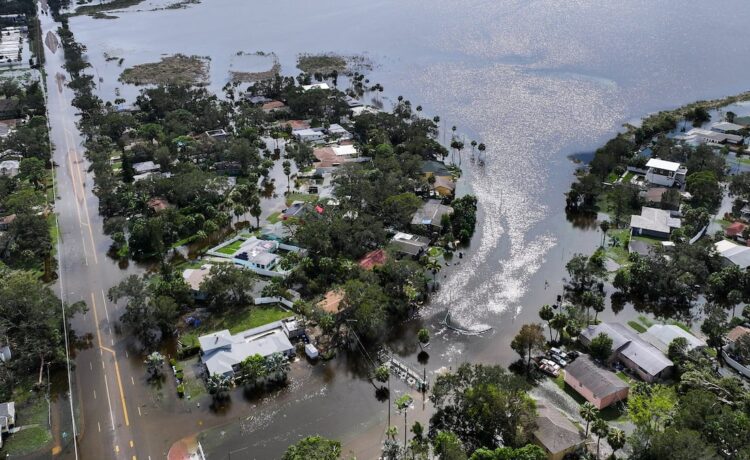The Federal Emergency Management Agency’s senior official overseeing Florida’s storm recovery process wants residents dismayed by a lack of assistance to reach out with any questions or concerns.
Nearly 133,000 Pinellas County residents have applied for individual assistance from FEMA due to Hurricane Milton’s widespread impacts, and the agency has disbursed over $112 million. Hurricane Helene resulted in 78,723 applications and $52.9 million in local funding.
However, many residents have flooded social media to discuss application denials and a system they believe has failed. Willie Nunn, Region 10 administrator for FEMA, said the agency often needs additional information to process requests.
“We’re willing to work with folks to make sure that they can get to where they need to be,” Nunn told the St. Pete Catalyst. “And get the documentation they’re trying to procure to get things done.”
Online rumors regarding FEMA are rampant. Many have suggested that the agency has denied assistance due to a lack of federal funding. Nunn said that is “absolutely untrue.”
FEMA has already committed $138.8 million in individual and housing assistance to Florida residents impacted by Milton. Statewide funding for Helene has topped $317 million.
“We have the funds, we have the personnel, and we have resources to help folks in Hurricanes Milton, Helene and Debby,” Nunn said. “At the moment, we have what we need to do our job.”
Milton damaged 12,647 homes in Pinellas. Over 4,900 were in St. Petersburg — the highest tally, by far, among the county’s 24 municipalities.
Many homeowners have realized they must submit a claim to their insurer before applying for rebuilding assistance. Robert Guinn, a partner at Tampa-based Cole, Scott & Kissane, the state’s largest civil litigation firm, said FEMA funding is a “first line of disaster recovery” and not a substitute for insurance claims.
Guinn said FEMA typically caps recovery assistance at roughly $42,000. He is unaware of data showing the agency denied applications at a “greater rate than any other location or any other storm.”
Nunn urges residents to apply “for what their needs are, whether they have insurance or not.” He said the agency will not offer duplicate benefits but will attempt to fill monetary gaps.
“The main goal is to get that person to a safe, sanitary and secure place,” Nunn added. “We just have to work with them to see what they need and what we can offer under the individual assistance program.”
FEMA has provided most local applicants with at least $750 in emergency assistance. Some have noted they were initially denied and later received approval, often after speaking to a representative.
Nunn encourages applicants to apply online or through FEMA’s mobile application. He also realizes the toll-free phone number typically has an extensive wait time, but stressed the importance of “constant communication” to ensure the agency can meet survivors’ needs.
“They may become eligible as their situation changes,” Nunn said. “They may require a FEMA inspector to come to their home. … It’s not a one-size-fits-all.”
He noted that residents can speak to representatives at Disaster Recovery Centers. St. Petersburg’s facility is inside the Enoch D. Davis Center at 1111 18th Ave. S.
Nunn said FEMA is working to “double-down” on individualized recovery efforts. Disaster Survivor Assistance Teams are in communities “talking to folks” and “continuously trying to get to what exactly people need out there.”
FEMA recently opened its Transitional Sheltering Assistance program to area residents. Many people who did not apply received notifications stating that the agency would pay for an up to 30-day stay at participating hotels.
Nunn said FEMA automatically includes residents who registered for emergency needs assistance and meet specific criteria in the sheltering program. He explained that the rooms were “already paid for.”
Several recipients who can remain in their homes have inquired about transferring their hotel vouchers to families without acceptable housing. “Please have them contact us,” Nunn said. “What we need to do is meet them where they are, get them the assistance they need and make sure they’re not lacking … especially if they’re eligible.”
Nunn also noted that FEMA is “very cognizant” that most affected areas lack available hotels. He again stressed that survivors, particularly those without transportation to other parts of the state, should relay those impediments to representatives.
Nunn pledged that the agency would work with local and state officials to overcome those obstacles. He said that could include direct housing.
This content provided in partnership with stpetecatalyst.com.
• • •
What to know about FEMA checks, other federal Florida aid after Milton
Could Tampa Bay flood insurance rise after a hurricane? A warning from Hurricane Ian
11 ways to help struggling Tampa Bay businesses after Milton and Helene
How to handle fires, tree limbs and other hazards after Hurricane Milton












